The global manufacturing industry is undergoing a seismic shift. Traditional factories, once defined by repetitive manual processes and linear production lines, are now being replaced by smart factories—digitally empowered ecosystems where machines, people, and data coexist in a unified, intelligent system. According to McKinsey & Company, companies that implement smart manufacturing practices can expect up to a 30% increase in productivity and a 50% reduction in machine downtime.
As we approach the second half of the decade, it’s clear: the future of manufacturing isn’t just automated—it’s digital, connected, and intelligent. At the forefront of this evolution are technologies like IoT, AI, digital twins, edge computing, and advanced robotics, each converging to create agile, data-driven factories optimized for speed, precision, and resilience.
For healthcare, logistics, software, AI/ML, blockchain, eClinical, and manufacturing firms—especially those looking to outsource, scale, or innovate through dedicated development teams—the rise of smart factories is more than a trend. It’s a strategic imperative.
What is a Smart Factory?
A smart factory is a highly digitized and connected production facility that uses a combination of cyber-physical systems, advanced analytics, and machine learning to make decisions in real time. Unlike traditional factories, which rely heavily on human intervention and rigid systems, smart factories are adaptive, predictive, and self-optimizing.
These factories leverage Industrial Internet of Things (IIoT) devices to collect data from machines, equipment, and systems across the factory floor. This data is then analyzed to enable predictive maintenance, quality control, resource optimization, and intelligent automation.
Key Technologies Powering Smart Factories
1. Industrial Internet of Things (IIoT)
IIoT sensors are the backbone of any smart factory. They collect data on temperature, vibration, energy consumption, and more. This real-time data empowers manufacturers to monitor equipment health, track production metrics, and prevent costly downtime.
According to Statista, the number of connected IoT devices in industrial settings is expected to reach 18 billion by 2025, with manufacturing being the largest contributor.
2. Artificial Intelligence and Machine Learning
AI algorithms are now used to optimize everything from supply chain forecasting to robotic behavior. Machine learning models analyze historical and real-time data to predict outcomes—such as component failure or production inefficiencies—before they happen.
Example: Siemens' AI-based predictive maintenance system reduced unplanned downtimes by over 45% in their smart manufacturing units (source: Siemens, 2023).
3. Digital Twins
A digital twin is a virtual replica of a physical asset, process, or entire production line. It enables simulation, monitoring, and scenario planning in real-time. Manufacturers use digital twins to test system performance before making physical changes.
Use Case: General Electric uses digital twins for jet engine manufacturing, allowing them to simulate 1 million design iterations virtually before producing a single component.
4. Advanced Robotics and Cobots
Collaborative robots (cobots) work alongside human operators to perform tasks that are repetitive, dangerous, or require high precision. With AI vision systems and real-time decision-making, modern cobots are enhancing safety and productivity across industries.
By 2024, the cobot market is projected to reach $2.3 billion, growing at a CAGR of 41% (source: MarketsandMarkets, 2023).
5. Edge Computing
Edge computing enables data processing at or near the source—critical for real-time decision-making in latency-sensitive environments like manufacturing. Combined with 5G networks, edge computing is transforming how factories operate by minimizing delays and improving throughput.
6. Cloud Manufacturing Platforms
Cloud platforms allow real-time visibility across global production sites, suppliers, and logistics networks. They facilitate remote operations, collaboration, and the deployment of updates or analytics at scale.
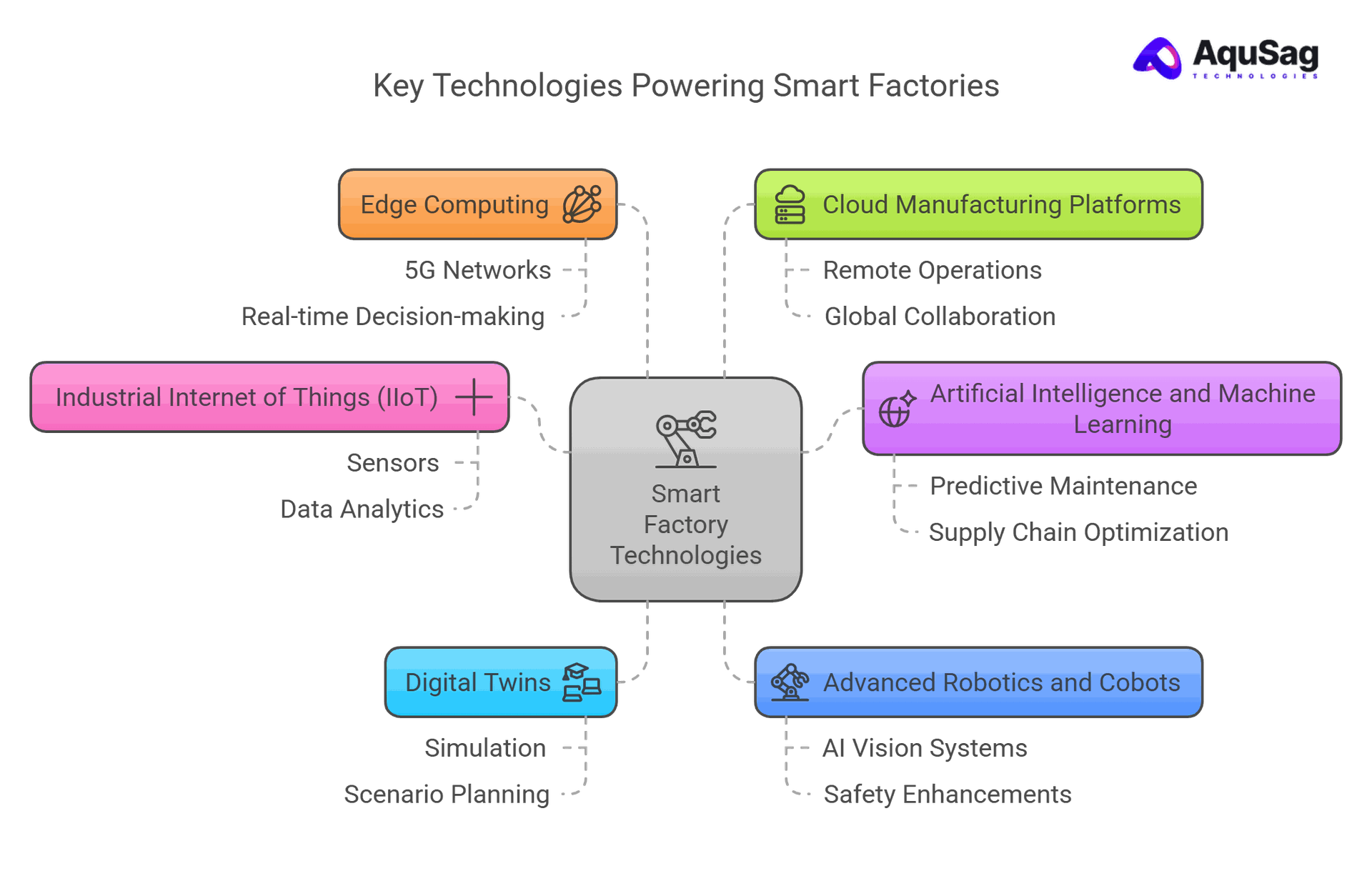
Featured Blog Post: The Rise of Fintech: How AI and Blockchain are Shaping Financial Services
Why Smart Factories Matter Now
1. Post-Pandemic Resilience and Agility
The COVID-19 pandemic exposed the vulnerabilities of traditional supply chains. Manufacturers faced material shortages, labor constraints, and demand volatility. Smart factories offer the agility and real-time data needed to quickly pivot production and mitigate risks.
2. Demand for Mass Customization
Consumers and B2B customers alike are demanding customized products at mass-production prices. Smart factories enable modular production lines and AI-driven customization, making it feasible to deliver personalized products at scale.
3. Sustainability and ESG Goals
Modern manufacturers are under pressure to reduce their carbon footprint and meet ESG (Environmental, Social, Governance) goals. Smart factories use data to minimize energy use, reduce waste, and optimize material usage.
A recent Deloitte report highlights that 76% of manufacturers investing in smart technologies report improved sustainability outcomes.
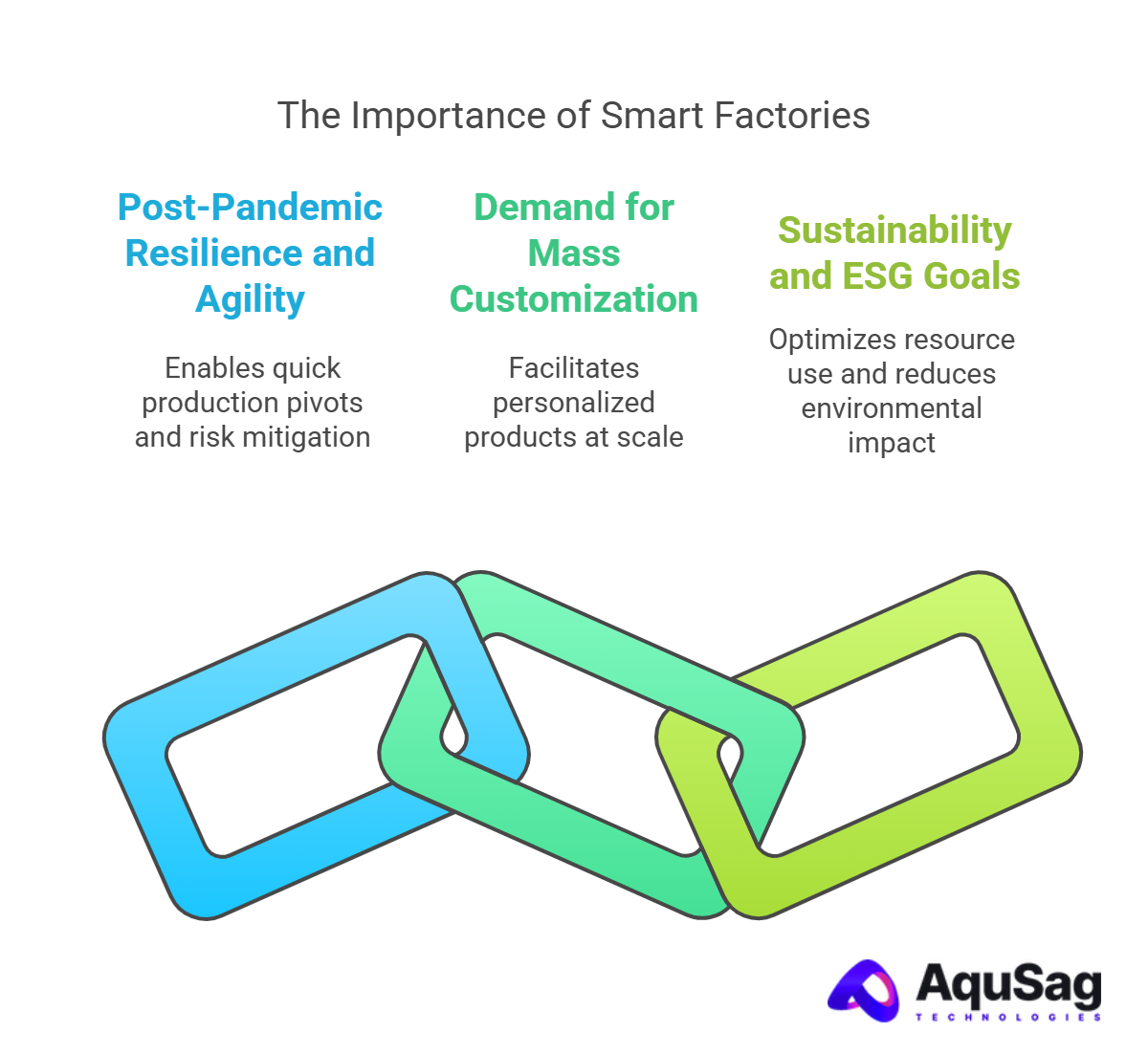
Industry-Specific Use Cases
Healthcare and Medical Device Manufacturing
Smart factories in healthcare settings are enabling precision manufacturing of medical devices with zero-defect tolerances. Through digital twins and real-time monitoring, manufacturers ensure compliance with regulatory standards while increasing throughput.
Example: Medtronic implemented a smart manufacturing system that improved product traceability by 60% and reduced defects by 35% (source: Medtronic Manufacturing Report, 2023).
Logistics and Warehousing
Autonomous mobile robots (AMRs), AI-based inventory management, and IoT-powered supply chains are becoming standard in logistics. Smart factory models applied to warehousing improve inventory accuracy, order fulfillment speed, and overall operational efficiency.
Blockchain-Integrated Manufacturing
Blockchain enhances supply chain transparency and traceability. When integrated into a smart factory, it ensures that every component or raw material is authenticated, recorded, and traceable across the product lifecycle—crucial for high-stakes sectors like aerospace and pharmaceuticals.
AI/ML and eClinical Operations
In biotech and eClinical sectors, smart factories are helping automate the manufacture of lab-on-a-chip devices and clinical diagnostics platforms. AI models adjust parameters in real-time to maintain compliance and ensure sterility, traceability, and reproducibility.
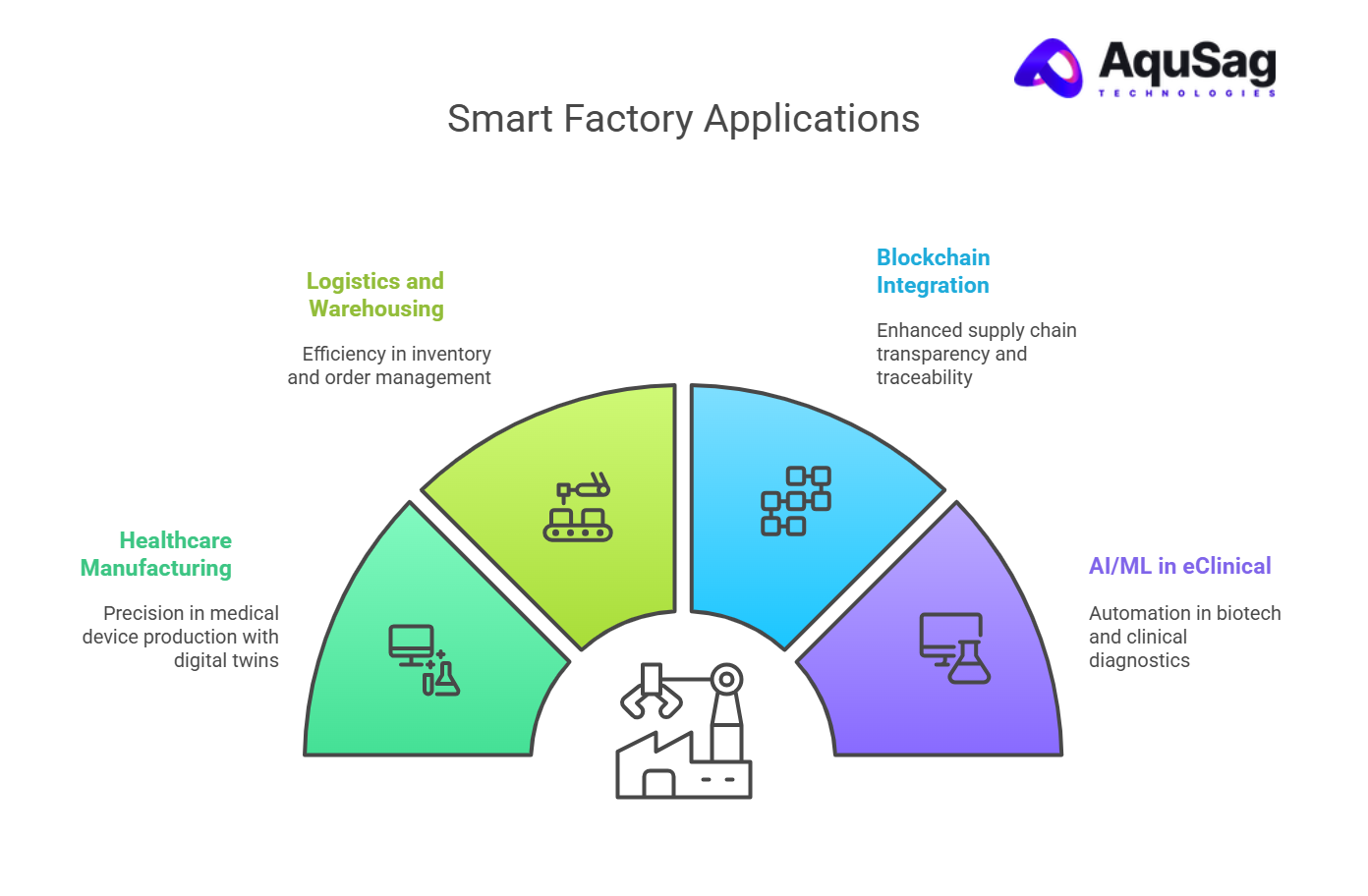
Business Impact for Decision Makers
For CTOs and CIOs
Smart factories offer a centralized data architecture, reducing technical debt while improving systems integration. CTOs can lead digital transformation by integrating factory operations with enterprise resource planning (ERP) systems and cloud-native platforms.
For Heads of Innovation and R&D
Digital twins and AI simulation tools allow innovation teams to experiment without disrupting physical production. Product iterations become faster, more data-driven, and less costly.
For COOs and Operations Leaders
With predictive maintenance, automated workflows, and real-time KPIs, smart factories offer a significant uplift in operational efficiency. Many organizations report up to 50% reductions in operating costs within the first year of smart factory implementation (Capgemini, 2023).
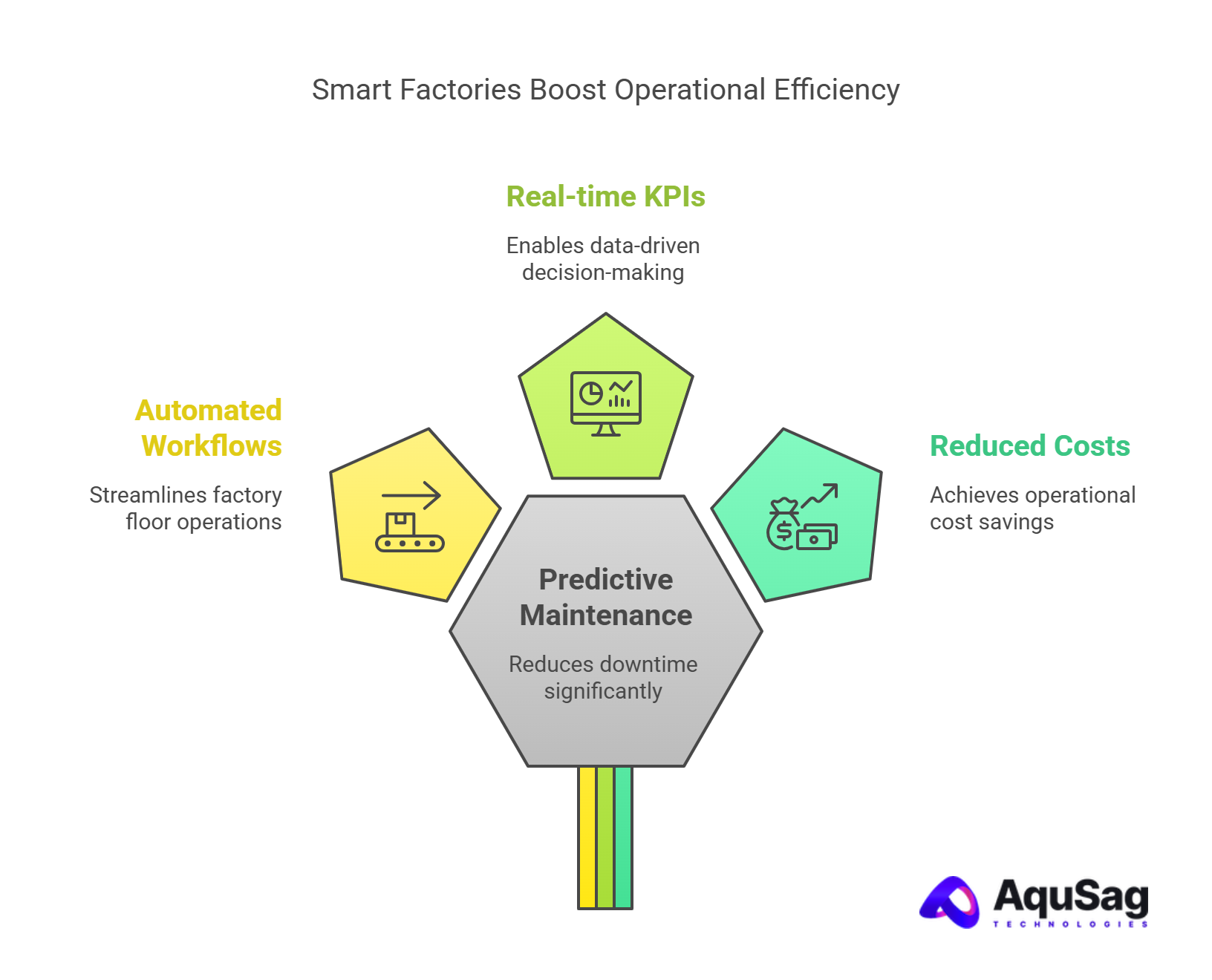
Featured Blog Post: Powering the Future: Digital Solutions for a Sustainable Energy Grid
Implementation Roadmap: From Legacy to Smart
Transitioning to a smart factory model requires a phased approach that aligns with both strategic goals and existing infrastructure.
Step 1: Digital Assessment
Conduct a comprehensive audit of current processes, systems, and infrastructure. Identify bottlenecks, manual dependencies, and critical assets.
Step 2: Define KPIs and Business Outcomes
Whether it's reducing downtime, improving quality, or increasing throughput, clear business outcomes must guide the digital transformation journey.
Step 3: Partner with Technology Experts
Collaborate with consulting and development partners like AquSag Technologies to architect and implement smart solutions tailored to your unique needs. Outsourcing dedicated development teams ensures faster time to market and cost-effective scaling.
Step 4: Start Small, Scale Fast
Implement pilot projects in specific lines or facilities. Use the results to fine-tune and then scale across the enterprise.
Step 5: Train and Upskill the Workforce
Even the smartest factories need human oversight. Invest in upskilling your workforce to work alongside AI, robotics, and digital platforms.
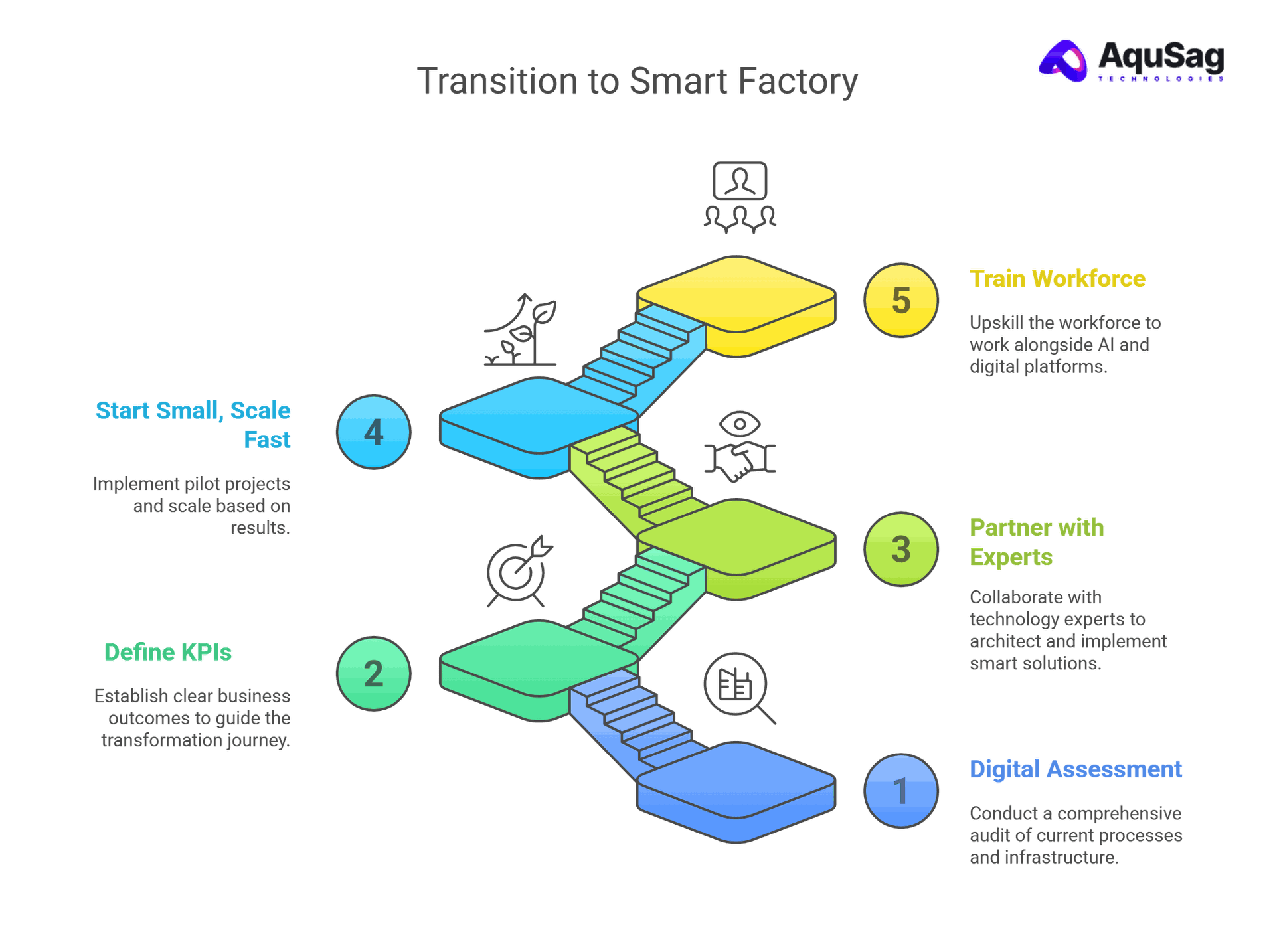
Challenges and Considerations
Despite the compelling benefits, smart factory adoption isn’t without hurdles:
- Legacy system integration challenges
- High initial capital investment
- Data security and cyber threats
- Skills gap and change management
However, these challenges can be mitigated with the right digital partner, a phased rollout, and a strong leadership vision.
The AquSag Advantage: Your Partner in Digital Manufacturing Innovation
At AquSag Technologies, we understand that building smart factories is not just about adopting new tools—it’s about transforming operations, culture, and value delivery.
Whether you are a logistics company optimizing warehouses, a healthcare manufacturer scaling compliant production, or a software or AI-driven enterprise building intelligent edge applications, AquSag offers:
- Dedicated development teams specializing in full-stack, cloud-native, and AI/ML applications
- Smart factory consulting services focused on automation, interoperability, and digital transformation
- Rapid prototyping and digital twin modeling to validate manufacturing innovations before full rollout
- Agile delivery models that support outsourcing, scaling, and ongoing innovation
Conclusion: Build the Factory of the Future, Today
Smart factories are not a distant vision—they are here, now, and accelerating the manufacturing evolution. For enterprises ready to innovate, scale, or digitally transform, this is the moment to lead.
At AquSag Technologies, we bring the technical expertise, strategic foresight, and agile development capabilities you need to power your journey toward Industry 4.0 and beyond.
Let’s build the future of manufacturing together.
Reach out to AquSag Technologies today to consult with our experts or assemble a dedicated team for your smart factory initiative.